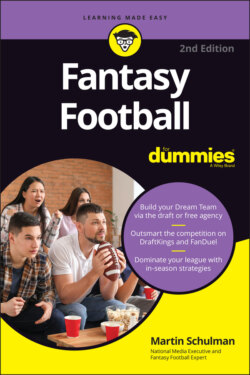Читать книгу Fantasy Football For Dummies - Martin A. Schulman - Страница 56
Joining the private sector: An invitation required
ОглавлениеA private league isn’t as secretive or exclusive as it sounds. Fantasy coaches are invited to play by another fantasy player in the league (often by the commissioner). So when Joe from Accounting invites you to join his league with his buds, Joe is the commissioner and you’re in essence joining a private league. The league’s website provider doesn’t randomly group fantasy players together like in a public league, and the commissioner customizes the rules and setup.
The only way you can play in a private league is if someone invites you (or you set up your own private league). Private leagues tend to be more good-naturedly competitive and more fun than public leagues, and they’re a great bonding tool. In fact, a private league is where fantasy football was meant to be played. Your league name and team names can be inside jokes that all the coaches are in on. You’ll probably see or talk to the other coaches in your league regularly, so now you’ll have even more to talk about.
Most sites require a private league to have a commissioner to run the show. The commissioner runs the league by collecting the dues (if applicable), setting the league rules, reviewing trades, and so on. The commish also plays in the leagues. A good commish can help his or her league flourish for years, but a bad commish may discourage coaches from signing up next season. Either way, the buck stops with the commish, so when you have questions or complaints, you’ll be heard quickly. (For more on the commish’s role, see the “Starting Your Own League: You Want to Be a Commissioner?” section later in this chapter.)
As with public leagues, private leagues offer both free and pay varieties. The following sections break them down.
